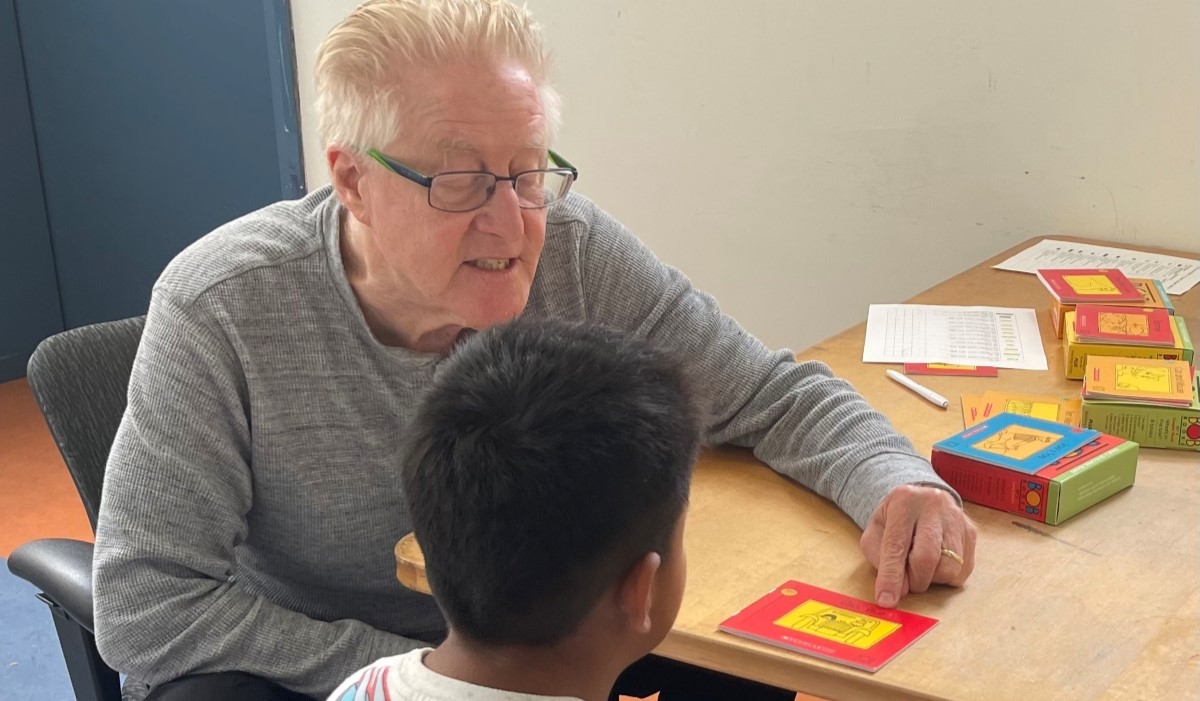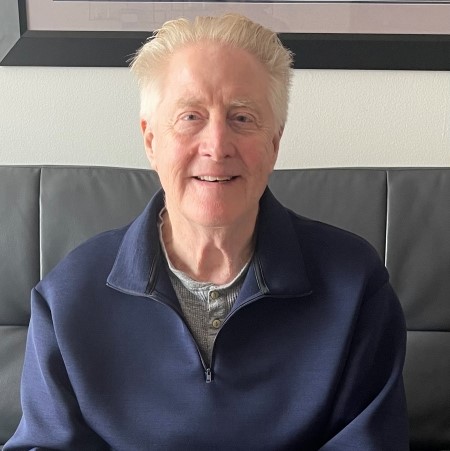LEADING STUDENTS TO LITERACY THROUGH VOLUNTEERING

Meet Daily Point of Light Award honoree Chris Fitzsimmons. Read his story, and nominate an outstanding volunteer or family as a Daily Point of Light.
Chris Fitzsimmons did a bit of teaching after college, but it’s as a volunteer tutor in retirement that he really shines.
Growing up with seven brothers and sisters, helping others was a way of life for Chris and his family. After retiring from a long career as a corporate trainer, Chris wanted to channel his free time into helping people learn. He inquired at his local library about potential tutoring opportunities and began working with children who struggled with reading. Eager to get involved in San Francisco’s public school system, Chris started working with the San Francisco Education Fund, an organization that advances equitable education by providing quality learning programs, community support and transformative financial resources to teachers, students and schools. He was placed in a third-grade classroom and has spent the last five years developing a meticulous tutoring system that has helped countless young people improve their reading skills.
Chris tutors over 50 students each week, spread across four mornings. He developed a comprehensive evaluation system that reviews which students need the most assistance, so he can focus on giving them the most attention. But he also puts in work outside the classroom. His extensive record-keeping program provides teachers with a helpful way to track each student’s progress and stay informed of their challenges. The teachers enjoy working with Chris so extensively that they have nominated him multiple times for the San Francisco Education Fund’s highest honor, the Distinguished Service Award.
While Chris loves to see the children expand their literacy skills, he makes a note of pointing out that he also loves to see them grow in their confidence and knowledge. He makes it clear that he loves watching people learn and hopes to simply be a means of helping them get from point A to point B. His willingness to channel his retirement into an experience of helping others is a powerful example of how volunteering can change the world.

What inspired you to get started with this initiative?
I was interested in tutoring after I retired, so I inquired at the San Francisco Library, and they had a program for teaching kids who are having trouble reading. I worked one-on-one with students to help them from the very ground up. I had a lot of success doing that. Then, I was interested in working in the San Francisco Public Schools, and so I inquired there. There’s an organization called the San Francisco Education Fund that manages volunteers, so I got trained with them, and got a placement at the Cleveland Elementary School in San Francisco, and I started there. I’m in my fifth year working with third graders.
Tell us about your volunteer role with the San Francisco Education Fund.
I work with two third-grade classes in Cleveland Elementary School. There are 43 total kids in the two classes. I do an informal reading evaluation for each of the kids and then put them into groups that I call red, yellow and green, like stop lights. Kids who are in the red group need the most help, and are maybe just beginning to read English or are reading at a first-grade level. Kids in the yellow group are reading at a second-grade level, and the kids in the green group are reading at a third-grade level or above.
I really concentrate on the red and yellow groups, since they need the most help. In this class of 43, there are 24 kids that I’ve identified who need help getting caught up to grade-level reading. I work individually with each of these kids, 10 minutes a day, twice a week. One big thing is that the school has lots of reading resources, so I’m able to pinpoint where the kids are and work on their particular reading issues. The more they progress, the harder the materials I give them. I’ve actually seen kids move from the red to the yellow group, or from the yellow to the green group.
What are your long-term plans or goals for the organization?
They’re pretty modest. I just want kids to read better by the end of the school year, no matter where they happen to be. But I also want them to have more confidence in reading. I think confidence just makes such a difference, and so for them to feel that way and to actually read better than when they started, those are my goals.
What’s been the most rewarding part of your work?
When I see one of the kids finally get it. For example, a really simple thing is that working with a difference in vowel sounds between Spanish and English. Most of the kids are Spanish speakers to begin with, but their vowel sounds are very different from English vowel sounds. As we’re reading, I keep on emphasizing the sound of the English vowel. After lots and lots of practice, they finally start to get it.
That, to me, is very worthy and I think that they feel better and more confident that they can actually read in a second language.
What have you learned through your experiences as a volunteer?
The third grade is a terrific grade to work with because they have matured quite a bit and can responsibly take on tasks, and yet they’re still young enough to be very pliable and adaptable – they learn quickly. I think it’s the perfect age to work with. I read that the third grade is a critical year. The saying they use is that in the third grade, you learn to read, and in the fourth grade, you read to learn. It’s just a really critical point.
Why is it important for others to get involved with causes they care about?
It gives a lot of life. Especially for retired people like myself, who may not have a lot going on, when they get involved in volunteering, and especially in my case, working with kids, they just give a lot of life enjoyment. I think that’s really, really worth it. I’ve heard a couple of tutors say that the kids saved us, and I can say for me too, it just brings so much life to my life.
Any advice for people who want to start volunteering?
If someone wants to work in a service job or volunteer position, like working at a soup kitchen or working to provide for the needs of the unhoused, I find that those organizations don’t require a lot of training. They just require that you show up and help out. Even taking that step is a big step for some people. I think it takes a little bit of courage and a little bit of determination to get over that hump. But once they do, they’ll find it’s very rewarding. They’ll be glad that they stepped out and tried something, and I think they’ll be quite rewarded because of it.
What do you want people to learn from your story?
Thinking of older adults like myself, it just makes a big difference to be involved in helping others. You don’t have to have a particular set of skills. You need to show up and show interest. In my case, the kids will respond very well. And I think that in other services, too, people will respond when you show interest and you’re consistent.
Do you want to make a difference in your community like Chris? Find local volunteer opportunities.